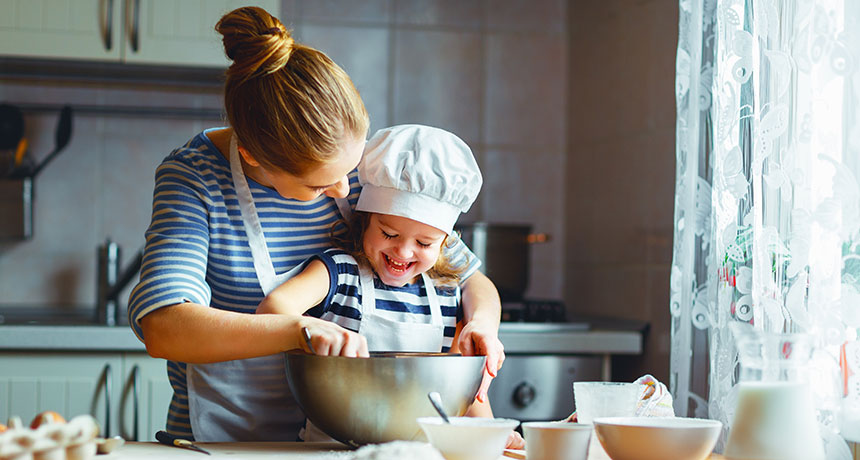How to help your toddler be helpful (with caveats)
Scientists disagree over why toddlers like to help, but the behavior is linked to success later in life

Helping and sharing in early childhood are linked to later successes in life, a study finds.
Evgeny Atamanenko/Shutterstock
Getting help from a toddler is a bit like not getting help: They mean well, but you may end up with more of a mess than when you started.
But given the choice, many kids prefer “real” activities to imaginary games, Bruce Bower recently reported in depth for Science News. And the benefits of recruiting your child for help with chores may go beyond conquering that pile of laundry: Research suggests that that kids who develop good “prosocial skills” — behaviors like helping and sharing — fare better in life when they’re older.
You may have noticed that your youngster is already interested in offering you assistance — handing you bread as you unpack groceries or carrying silverware to the table. There’s some debate in the research community about why this urge to lend a hand emerges.
One camp argues that humans have an innate tendency to come to the aid of others. Several years ago, a landmark study in Science found that kids as young as 18 months old will help — unprompted — an adult experimenter whose hands are full with tasks like picking up a dropped pen or opening a cabinet door. The researchers performed similar experiments with three young chimpanzees and found they also chipped in (though less reliably), suggesting that humans are inherently altruistic.
Other researchers say there’s no need to invoke altruism. They argue that young humans are socially, emotionally and behaviorally primed for all sorts of interactions, as are parents, and helping emerges from that mix. To oversimplify: Infants like social interactions and they like mastering new skills; helping lets them do both. (The desire to engage with others also manifests in behaviors like grabbing, biting or hitting, leading you to correctly believe that toddlers are both angels and sociopaths.) This camp points to the importance of “scaffolding,” the guidance and encouragement provided by adults during and after the helping act.
Regardless of whether helping is innate, when kids are between 12 and 15 months old, pointing out when assistance is needed and providing positive feedback seems to work. Researchers in one study used phrases like “Look, so-and-so dropped something, she can’t reach it. Do you want to help her?” to encourage one set of babies to help.
Another set of babies was left to their own devices. The ones who were encouraged helped twice as often as those who weren’t and also helped more on several subsequent trials when no encouragement was given, reported a team led by Audun Dahl, a developmental psychologist at the University of California, Santa Cruz.
Kids between 15 and 18 months old, however, were not influenced by the encouragement. These older infants were likely already “skilled” helpers, the researchers speculate, and so didn’t need prompting. (In a separate study, all surveyed mothers reported that their 16-month-plus-olds already “help” at home.)
The variability in responses is also a good reminder of the age factor: Let your child’s skills and interests guide their help and manage your expectations — sorting socks might be the extent of their assistance.
There are studies linking the development of behaviors like helping and cooperation to later success in both work and play. A study that tracked more than 700 kindergarteners from high- and low-risk backgrounds until roughly age 25 found that kindergarteners with good prosocial skills — qualities like helpfulness, unprompted cooperation with peers and understanding feelings — were more likely to graduate from high school, go to college and stay out of trouble with the law. But that study didn’t establish cause and effect. And researchers aren’t even in agreement about the extent to which prosocial skills can be taught.
The very notion of helping is tricky, which makes it hard to study, says Dahl. Helping isn’t always good: It can undermine the autonomy and competence of the person who is being helped, it can further something harmful (Do you help a bank robber? he asks) and it can be so self-sacrificial that it’s harmful.
So if you want to encourage a youngster to help, remember that it’s nuanced. Shel Silverstein’s poem “Helping” (sung by Tom Smothers on Free to Be … You and Me, which helped me and my siblings get through many hours of housework in our youth) summed it up best perhaps:
And some kind of help
Is the kind of help
That helping’s all about.
And some kind of help
Is the kind of help
We all can do without.
Laura Sanders is away on maternity leave. Rachel Ehrenberg is a Boston-based science journalist and former reporter at Science News, with degrees in botany and evolutionary biology. She has raised many plants and is now trying to raise a human being.







